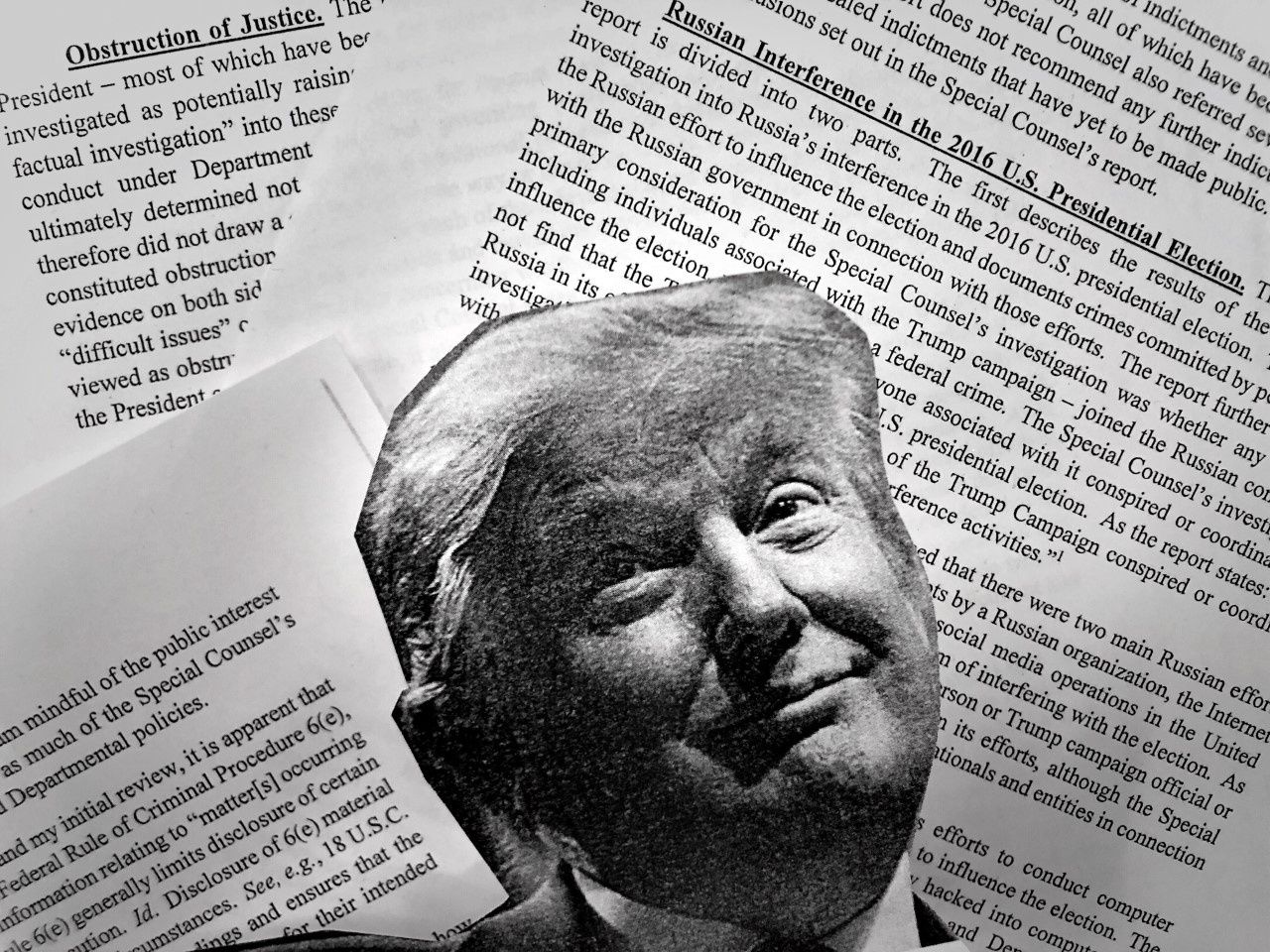March 26, 2019
After 22 months, 34 indictments, and half a million articles about Special Prosecutor Robert Mueller's III's investigation into possible Trump campaign collusion with Russia, the headline judgment came down to just four pages on a Sunday afternoon.
In a letter of that length summarizing the investigation, US Attorney General William Barr said Mueller's team had not established coordination between the Trump campaign and the Russian government ahead of the 2016 election. That's not quite an exoneration for President Trump, but it certainly plays well politically: "No Collusion!"
Barr also wrote that the Special Prosecutor had declined to issue judgment on whether the president tried to criminally obstruct the investigation.
For a top notch analysis of the letter's legal implications, we refer you to this piece by the legal eagles of Lawfare, here. From our perspective, the politics look like this:
Trump won. Yes, Trump and his family still face ongoing investigations of their businesses, personal finances, and non-profit organizations. But the bottom line is: collusion was the main focus in the Mueller investigation and the political circus that surrounded it. The fact that Trump appears to have beaten that rap will, for better or worse, now overshadow all else.
Expect Trump to play the vindication card shrewdly and ceaselessly for the next 18 months as he pursues re-election. Democrats will have to decide how much further to push the "Russiagate" line of attack. They, and the American people, will certainly want to see the full report – which could contain politically damning information about Trump and his associates. But the political evaporation of the "collusion" angle makes it harder, and riskier, to try to make other stuff stick.
Institutions worked. For nearly two years, a special prosecutor investigated a sitting president – one who famously disdains institutional checks and balances – and he completed his work largely unhindered.
Score this as a big win for the rule of law at a time when Trump's unconventional presidency has raised all kinds of questions about the resilience of American institutions.
But… caveat number one: under Trump's withering attacks, the FBI's image suffered with Republican voters, while gaining with Democrats. Now that Mueller's findings (seemingly) went the GOP's way, will that change? A situation in which law enforcement comes to be seen constantly politicized by one or the other of America's political tribes is a bad thing in the long run.
And… caveat number two: there's already lots of hand-wringing about whether "the media" (a vague term we don't like much) has lost credibility for overhyping "Russiagate." A free, functional, and broadly trusted media is an indispensable democratic institution too.
Looking ahead to 2020
Don't forget, the Mueller investigation did show – and quite definitively – that Russia deployed a social media strategy to interfere in the 2016 election with the aim of helping Trump.
There are two important things to say about that. First, the Kremlin, and others, will be eying the opportunity to meddle again in 2020 – which opens up the question: what is the US government prepared to do about the vulnerabilities of US elections to meddling and manipulation by foreign or domestic actors?
Second, people will argue forever about whether Russian meddling is what enabled President Trump to win. The truth is that we will never know. What we do know, however, is that the social polarization that put Trump in a position to contend at all in 2016 – the divides between urban and rural, liberal and conservative, and white and non-white America – haven't gone away as the US heads into the 2020 election season.
The clear signal: As 2020 approaches, domestic polarization is still a whole lot more important than foreign interference.
More For You
Americans are moving less — and renting more. Cooling migration and rising vacancy rates, especially across the Sunbelt, have flattened rent growth and given renters new leverage. For many lower-income households, that relief is beginning to show up in discretionary spending. Explore what's changing in US housing by subscribing to Bank of America Institute.
Most Popular
Walmart sponsored posts
Walmart’s commitment to US-made products
What's Good Wednesdays
What’s Good Wednesdays™, February 4, 2026
World Central Kitchen staff hand out free soup in a neighbourhood that experiences electricity and heating outages following recent Russian attacks on Ukraine’s civilian infrastructure during subzero temperatures in Kyiv, Ukraine February 3, 2026.
REUTERS/Thomas Peter
1,170: The number of high-rise buildings in Kyiv that were left without heating following a barrage of Russian attacks last night on Ukraine’s capital and its energy facilities, per Kyiv Mayor Vitali Klitschko.
Protesters gather during a candlelight vigil, and interfaith prayer at Fort Lauderdale-Hollywood International Airport as airport workers and faith leaders rally calling on the federal government to extend Temporary Protected Status for Haiti on Jan. 28, 2026.
Diaz/Miami Herald via ZUMA Press Wire
Over the past five years, Haiti has endured extreme political turmoil, escalating violence, and one of the world’s worst humanitarian crises.
Microsoft unveiled a new set of commitments guiding its community‑first approach to AI infrastructure development. The strategy focuses on energy affordability, water efficiency, job creation, local investment, and AI‑driven skilling. As demand for digital infrastructure accelerates, the company is pushing a new model for responsible datacenter growth — one built on sustainability, economic mobility, and long‑term partnership with the communities that host it. The move signals how AI infrastructure is reshaping local economies and what people expect from the tech shaping their future. Read the full blog here.
© 2025 GZERO Media. All Rights Reserved | A Eurasia Group media company.
